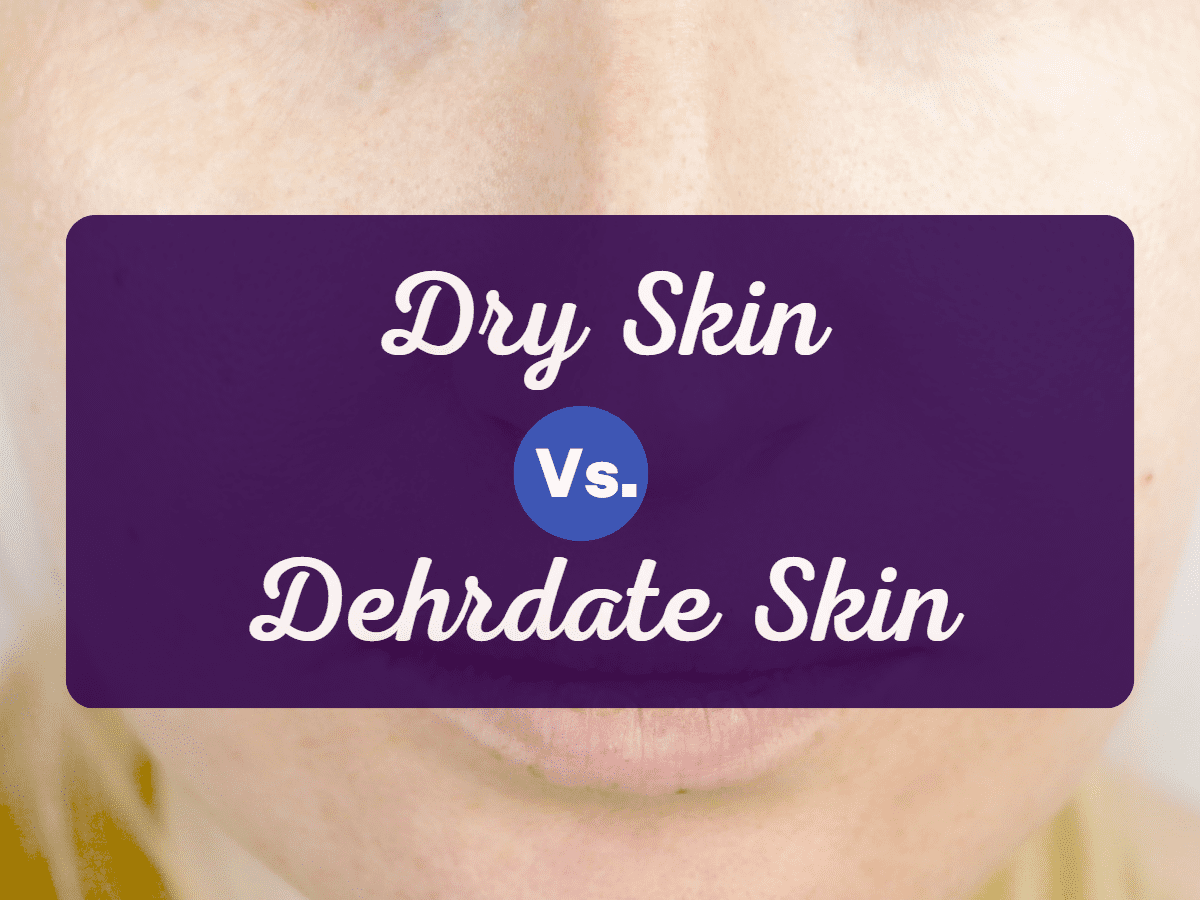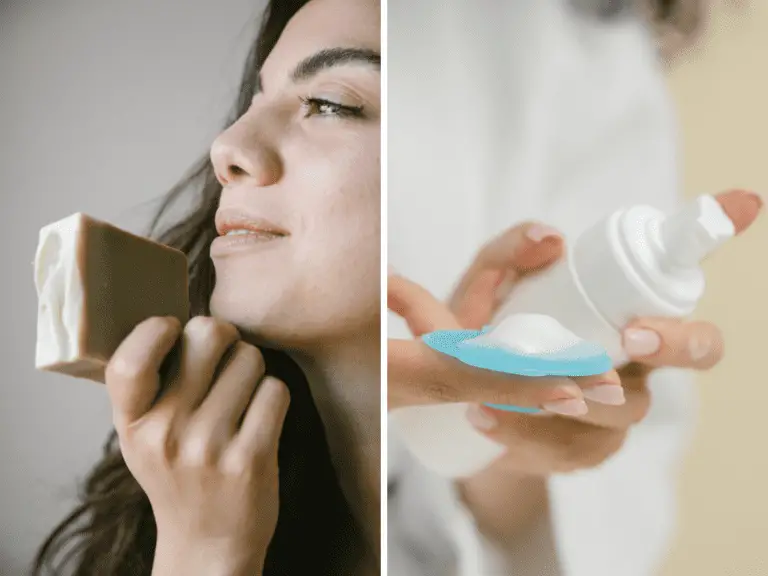Have you ever noticed that your skin feels tight, rough, or itchy?
You may be experiencing dry or dehydrated skin. These two skin conditions are often confused but have different causes and require different treatments.
In this post, we’ll break down the differences between dry and dehydrated skin and give tips on treating them both.
Is dehydrated skin the same as dry skin?
Dehydrated and dry skin are often used interchangeably to describe skin lacking moisture.
However, they are not the same thing. There are significant differences between the two.
If you understand these differences, it can help you choose the right products and skincare routine to keep your skin healthy and happy.
How Can You Tell If You Have Dehydrated Skin or Dry Skin?
To determine whether you have dry or dehydrated skin, you need to assess your skin’s overall appearance and texture and how it reacts to certain factors, such as weather, skincare products, and lifestyle habits.
Here is how!
Let’s take look at the differences between these two!
What’s the Difference Between Dry Skin and Dehydrated Skin?
What is Dry Skin?
Dry skin, also known as xerosis, is common when the skin loses its natural moisture and becomes rough, itchy, and flaky. The severity of dry skin can vary, ranging from mild to severe, and can affect any body part.
Symptoms of dry skin include:
- Rough, scaly, or flaky skin
- Tightness or a feeling of stiffness in the skin
- Itchiness or a sensation of scratching
- Cracks in the skin, which can sometimes bleed
- Redness or inflammation
While dry skin can affect anyone, it is more common in older adults, people who live in dry climates, and those with a history of eczema or allergies.
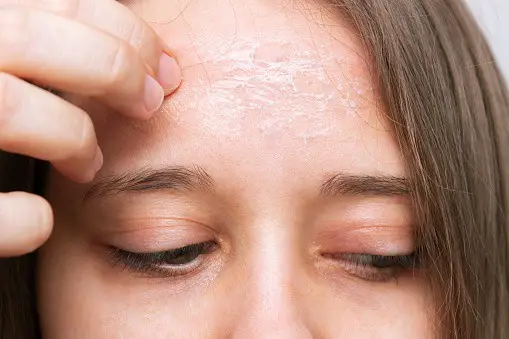
What Causes Dry Skin?
Many factors can contribute to the development of dry skin, including:
- Environmental factors: Dry skin is often the result of exposure to harsh environmental factors, such as cold temperatures, low humidity, and dry air. These conditions may cause the skin to lose moisture and become dry, itchy, and flaky.
- Hot showers and baths: Although relaxing, they can also harm the skin. Hot water can strip the skin’s natural oils, leading to dryness and irritation.
- Skin care products: Certain skin care products, such as harsh soaps and detergents, can strip the skin’s moisture, leading to dryness and irritation.
- Medical conditions: Certain conditions, such as eczema, psoriasis, and thyroid disorders, can cause dry skin.
- Aging: As you age, your skin becomes thinner and loses its ability to retain moisture, leading to dryness and wrinkles.
- Genetics: Some people are more prone to dry skin due to their genetics.
What is Dehydrated Skin?
Dehydrated skin is a common condition that occurs when the skin lacks moisture and becomes dry, tight, and flaky.
Unlike dry skin, which is caused by a lack of oil production, dehydrated skin results from inadequate hydration.
This means that even oily skin types can experience dehydration if they don’t drink enough water or use products that strip the skin of its natural moisture.
Dehydrated skin can affect anyone, regardless of age, gender, or skin type.
Symptoms of dehydrated skin:
- Rough, scaly, or flaky skin
- Dull complexion
- Fine lines and wrinkles
- Tightness and discomfort
- Itchiness and redness
- Breakouts and inflammation
If you’re experiencing any of these issues, it’s important to replenish your skin’s moisture levels and restore its natural barrier function. This can help prevent further damage and promote healthy, glowing skin.
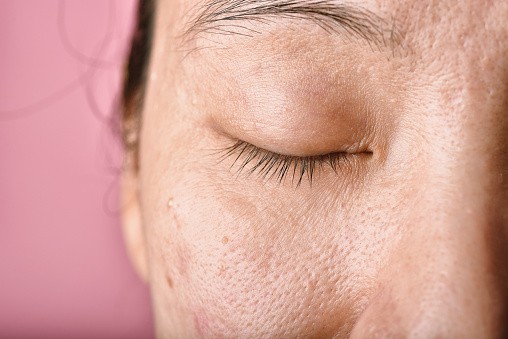
What Causes Dehydrated Skin?
Many factors can cause dehydrated skin, including:
- Not Drinking Enough Water – if you don’t drink enough water, your body will become dehydrated, and your skin will lack water.
- Environmental factors: Exposure to harsh weather conditions, such as wind, cold, and sun, can damage the skin’s protective barrier and cause moisture loss. Indoor heating and air conditioning can also dry the air and dehydrate the skin.
- Lifestyle habits: Certain lifestyle habits, such as smoking, drinking alcohol, and consuming a diet high in salt and caffeine, can dehydrate the body and affect the skin’s moisture levels.
- Skincare products: Some skincare products, particularly those containing alcohol, fragrance, and other harsh ingredients, can lead to dehydration. Over-exfoliating or using hot water to cleanse can also worsen the condition.
- Medical conditions: Certain conditions, such as diabetes, thyroid disorders, and psoriasis, can affect the skin’s ability to retain moisture and lead to dehydration.
- Age: Our skin becomes less efficient at producing oil and retaining moisture as we age, leading to dryness and dehydration.
Can You Have Both Dry and Dehydrated Skin?
Yes, you can have both dry and dehydrated skin simultaneously.
Although “dry” and “dehydrated” are often used interchangeably, they refer to different skin conditions.
Dry skin is a skin type. On the other hand, dehydrated skin is a skin condition that can affect any skin type.
Dry skin lacks oil or sebum, while dehydrated skin lacks water or moisture.
When your skin is dry, it feels rough, scaly, or itchy and may have small cracks or flakes.
On the other hand, when your skin is dehydrated, it feels tight and dull and may have fine lines or wrinkles.
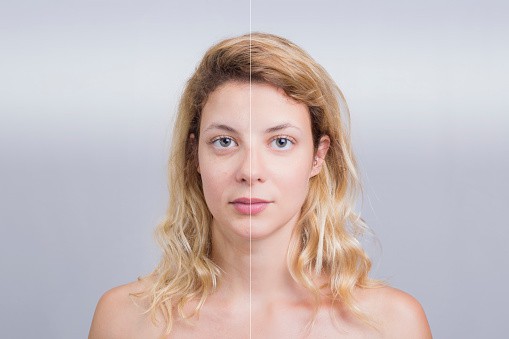
How to Treat Dry and Dehydrated Skin?
- Use a Gentle Hydrating Cleanser: Harsh, foaming cleansers can strip the skin of its natural oils, worsening dryness. Look for a gentle, hydrating cleanser that does not contain harsh detergents.
- Moisturize Regularly: Use a rich, emollient moisturizer daily to soothe and nourish the skin. Look for ingredients like ceramides, shea butter, and glycerin, which lock in moisture and improve the skin’s natural barrier function.
- Use a hydrating serum: Serums are lightweight, fast-absorbing products that penetrate deeper into the skin than moisturizers. Look for serums that contain hyaluronic acid, which can help your skin retain moisture.
- Exfoliate Gently: Regular exfoliation can help to remove dead skin cells and promote cell turnover, but be careful not to overdo it. Use a gentle chemical exfoliant like alpha-hydroxy acids (AHAs) or beta-hydroxy acids (BHAs) once or twice a week to avoid irritating the skin.
- Drink Plenty of Water: Drinking enough water is essential for maintaining healthy skin hydration. Drink at least 8-10 glasses of water daily, and consider incorporating hydrating foods like watermelon, cucumber, and celery into your diet.
- Wear sunscreen: Sun damage can exacerbate dryness and accelerate aging, so it’s important to wear sunscreen daily, even in winter.
- Avoid harsh ingredients: Harsh ingredients like alcohol, fragrances, and sulfates can strip your skin’s moisture and exacerbate dryness. Avoid products that contain these ingredients and opt for gentle, non-irritating products instead.
Final Thoughts
While dry and dehydrated skin shares similar symptoms, they have different underlying causes and require different treatments. By identifying the root cause of your skin concerns and choosing products and practices that cater to your skin’s unique needs, you can effectively treat dry and dehydrated skin and achieve healthy, glowing skin.

